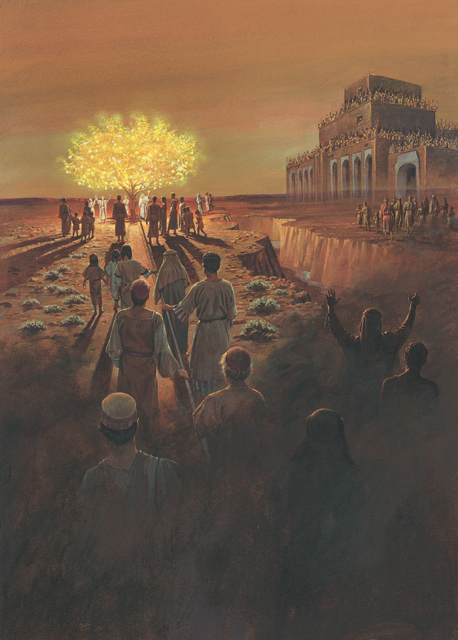 The Broadway musical "The Book of Mormon," created by the South Park duo Parker and Stone, mocks Latter-day Saints, their faith and religion, their missionaries and culture, in a vulgar and absurd way.
The Broadway musical "The Book of Mormon," created by the South Park duo Parker and Stone, mocks Latter-day Saints, their faith and religion, their missionaries and culture, in a vulgar and absurd way.Don't get me wrong. Mormons have a funny, sometimes endearing, sometimes hilarious culture with plenty to tickle the ribs. I am sure we can look pretty odd to others as we attempt to live our faith. With family and friends, I've had my share of laughs at myself and the quirky culture that swirls around us.
But mocking is different. To mock is to criticize, laugh at, or make fun of. It belittles, puts down, and plays down. It distorts and deceives. It separates people. It's rude and unkind and often heartless. It's a pernicious form of propaganda. It invites clashes and conflict and sometimes violence.
I've often wondered, since it came out in 2011, how the musical might have been received if the producers chose Muslims instead of Mormons to make fun of. I suppose some rights should be valued above the right of free speech, such as the right to life itself.
In the end, this Broadway venture will not endure the test of time. In time, it will be "thrust down" like every other unholy thing. As the Lord told Moroni, "fools mock, but they shall mourn" (see Ether 12:28).
Jude, who is thought to be a brother of Jesus and James, wrote that:
There should be mockers in the last time, who should walk after their own ungodly lusts. These be they who separate themselves, sensual, having not the Spirit. (Jude 1:18–19.)Nephi spoke of those who pointed their fingers and mocked from the "great and spacious building":
And I also cast my eyes round about, and beheld, on the other side of the river of water, a great and spacious building; and it stood as it were in the air, high above the earth. And it was filled with people, both old and young, both male and female; and their manner of dress was exceedingly fine; and they were in the attitude of mocking and pointing their fingers towards those who had come at and were partaking of the fruit [of the tree of life]. (1 Nephi 8:26–27.)Before the destruction of Jerusalem and its temple at the hands of Babylonian invaders, we read:
Moreover all the chief of the priests, and the people, transgressed very much after all the abominations of the heathen; and polluted the house of the Lord which he had hallowed in Jerusalem. And the Lord God of their fathers sent to them by his messengers, rising up betimes, and sending; because he had compassion on his people, and on his dwelling place: but they mocked the messengers of God, and despised his words, and misused his prophets, until the wrath of the Lord arose against his people, till there was no remedy. (2 Chronicles 36:14–16.)Finally, at the time of Christ's Second Coming, we also read that "calamity shall cover the mocker":
And the Lord shall utter his voice, and all the ends of the earth shall hear it; and the nations of the earth shall mourn, and they that have laughed shall see their folly. And calamity shall cover the mocker, and the scorner shall be consumed; and they that have watched for iniquity shall be hewn down and cast into the fire. (D&C 45:49–50.)I don't intend to mock the mockers here. I don't want to mock anyone. I just want to point out that if you or I mock what is good and right and pure, it will not go well for us.
Be not deceived; God is not mocked: for whatsoever a man soweth, that shall he also reap. (Galatians 6:7.)I take the same advice that I offer: Be careful what you say about sacred things.
Bonus: Read this op-ed of the "Book of Mormon" musical by Kate Wilson who is not a member of the Mormon faith. Caution: it's not pleasant reading.
Continue reading at the original source →



